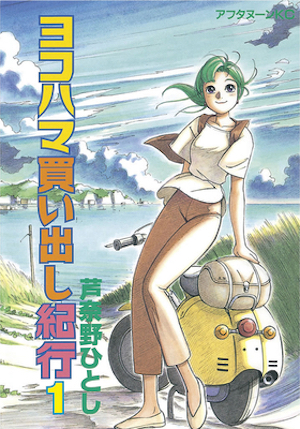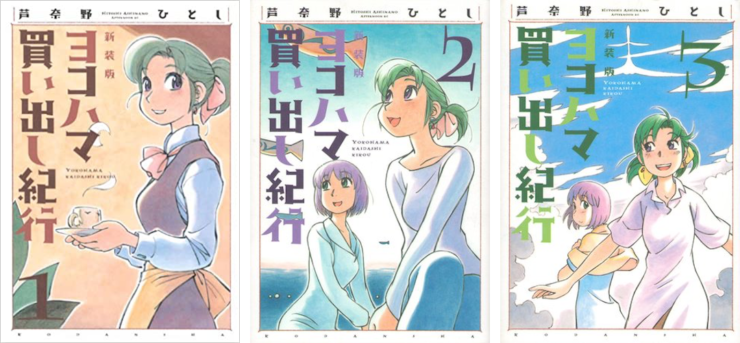I was pleased to read that Seven Seas has obtained the license to Hitoshi Ashinano’s post-apocalyptic manga Yokohama Kaidashi Kikō. Heretofore North Americans wishing to enjoy Ashinano’s slice of life manga had the choice of importing tankōbon from Japan (which, unsurprisingly, are in Japanese) or resorting to fan-made scanlations on sites whose legality is dubious at best. As of next August, authorized translations will be available in both dead tree and electronic formats. Huzzah!
Some readers may be thinking “post-apocalyptic” does not sound fun, living as we do in a world where each day is a race between new Covid variants, economic derailments, climate changes, and the possibility that the last thirty years were merely a misleading detour that left us back on the path to thermonuclear exchange.
BUT… don’t be deceived by “post-apocalyptic”! Ashinano’s YKK (as the manga is sometimes nicknamed) is tremendously life-affirming fun. There is a reason YKK’s era is called the Age of the Calm Evening.
Though there is, of course, the small matter of the end of the world as we know it.
Exactly what went wrong decades earlier is unclear, but the consequences are obvious. Ocean levels rose dramatically, with the effects on coastal infrastructure one would expect. The human total fertility rate appears to have dipped well below replacement levels. YKK’s Earth is a quieter, damper world than ours. This is not a crisis to which characters react. It is the background they accept as normal.
However, while humanity appears to uninterested in doing anything to forestall extinction, our legacy will be more than dramatic climate change, enigmatic ruins, and genetically engineered plants. Before their fall, humans engineered androids. Those androids are more than able to carry the torch of human civilization long after humans have vanished.
Alpha is one such android. Having inherited a tea house from her long-vanished master, she is content to provide a tranquil tea-drinking experience to the community around her. Alpha is effectively immortal, but the humans around her are not. Thus, Alpha is a fixture in an ever-changing community. Children become adults and move away. Adults unwilling to move will age and eventually die.
Buy the Book


Yokohama Kaidashi Kikou: Omnibus Collection 1
This might sound like a downer, but it’s not. Whatever went wrong went wrong decades ago. The period in which YKK is set may be an era of decline but it is a very gentle decline, one without the usual tension, fear, or violence one expects from post-apocalypse societies. Life’s necessities can still be obtained and if the process is more onerous than it was before the oceans rose, very few people remember that era. They’re no more alarmed at Amazon’s absence than we are by the curious lack of decent matter replicators in our homes.
Also calming: the author has a fine eye for landscapes. Few humans means fewer impediments to scenery porn, such as lavishly depicted rustic vistas and the drowned ruins of today’s cities. Humans might just get in the way.
Finally, the characters are an endearing lot, even if some of them will remain on stage long after others have retired to their graves. Ashinano doesn’t need to resort to violence-driven drama because the daily interactions between the characters are more than enough to hold the reader’s interest.
YKK is a welcome alternative to the usual post-apocalyptic stories and once August rolls around—if August rolls around—you will be able to verify this for yourself.
In the words of Wikipedia editor TexasAndroid, prolific book reviewer and perennial Darwin Award nominee James Davis Nicoll is of “questionable notability.” His work has appeared in Publishers Weekly and Romantic Times as well as on his own websites, James Nicoll Reviews and the Aurora finalist Young People Read Old SFF (where he is assisted by editor Karen Lofstrom and web person Adrienne L. Travis). He is a four-time finalist for the Best Fan Writer Hugo Award, is eligible to be nominated again this year, and is surprisingly flammable.










